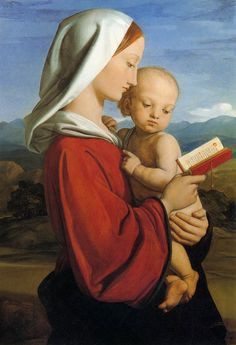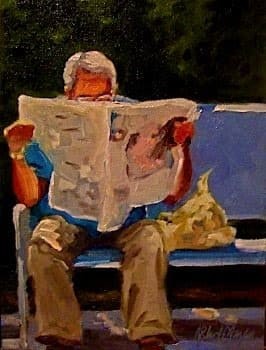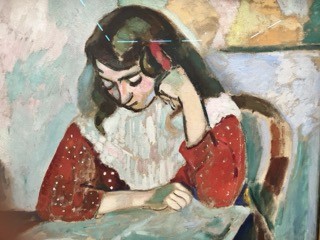| I’m a music education professor and music literacy is an area of research for me. I am intrigued by your work on disciplinary literacy and my colleague and I are interested in determining how disciplinary literacy could be applied to music. I’ve searched, but have found no research in this regard. Do you know of any? Also, I would love to hear your opinions regarding directions we could take as we look into this subject further. As of now, we see a need to look at music notation literacy as well as the literacy associated with writing about music. Further, we see four types of musical thinking that may use music and language differently – creating, responding, performing, and connecting. Needless to say, things are getting complicated. We would love any input you could give! I hope it doesn't bother you to much that you are asking this of someone who can't carry a tune in a bucket. Like you, I know of no research on music literacy. Certainly, there is musical notation and that may or may not have a place in your program depending on your focus. However, for the purpose of this discussion, let’s just focus on English prose (teaching musical thinking makes great sense to me, but I wouldn't be the guy to go to for that unless off-key humming is prominent in the scheme). Although there is not research on music, or on many sub-disciplines and specializations, that doesn't mean we have nothing to proceed on. With music, I think there are at least three possible directions that could be taken--and I'd recommend all three. First, some music programs focus heavily on the science of tonality and other aural phenomena. That means scientific or technical texts make sense and those kinds of material need to be read very much like science. We do know something about science reading and that would be relevant here. Second, some music programs emphasize musical history—exploring the relationship between music and various historical eras, and considering how music was created or which instruments were used and how and why that changed over time. This kind of material definitely should be read in the same fashion as other historical materials. Look at what we know about the reading of history. Third, some music programs pay at least some attention to musical appreciation and critique. How does one analyze and evaluate a piece of music. What are the criteria for evaluation and the language of such musical criticism? This requires reading akin to what students might be expected to take on in a literature program (though, in fairness, I know of no studies of the reading or writing of criticism, per se). I guess what I’m saying is that some fields draw from one ore more disciplines and that means their reading and writing experience will be similar to the reading and writing routines, language, and insights of those related to those fields. I think that is something to be candid about with students: musical scholarship requires the ability to handle technical materials like a scientist, historical materials like a historian, and criticism in the fashion of a music critic; and students would necessarily have to recognize the diversity of those demands and adjust accordingly. I would say the same thing for social studies (history, geography, economics, culture) and science (biology, chemistry, physics, but also subspecialties like botany). The readers in those fields need to be able to shift their routines depending on the nature of the problems and the texts. Reading and writing demands can also vary within a field of study across various kinds of goals or purposes. That's the situation in music, I think. Not all reading purposes require the same processes or combination of processes, so you need to pay attention to the routines and approaches you and your colleagues use in their work (and how to reveal those to students). |
Disciplinary Literacy: What about music and other subjects?
What Are your thoughts?
Leave me a comment and I would like to have a discussion with you!

As a music educator, I’d like to add another type of text to this conversation—composer’s notes. These “musical instructions” are technical text that helps make music a "technical subject" under the Common Core literacy standards.
For a professional musician to be successful, they must be technically literate in the art form. They must be able to successfully interpret the musical notation and transform that information into musical sound. There is a great deal of technical information that is critical to that task, and therein lies the "sweet spot" for me in musical literacy.
Music students, therefore, must learn to be technically literate in reading musical notation, technically skilled on their instrument or voice, and should be able to read and comprehend musical technical text such as the composer's notes included in a musical score. This technical text describes musical elements such as articulation, dynamics, form, balance, and timbre about a composition that are all critical to an authentic performance. These elements are more technical than aesthetic. Composer’s notes and other interpretation instruction documents are increasingly available as composers try to influence the performance of their works and other musicians publish research.
It's been my experience that music teachers have typically not shared musical technical text with their students--myself included. But why shouldn’t we give our music students the opportunity further their overall literacy skills by distributing composer's notes and other text that may guide the performance of a composition when we pass out the musical parts? They'll become smarter, more literate musicians, while strengthening their literacy skills in general.

I had a (non-music) professor in college who brought up a good point about literacy and that there are three aspects that we should take into account. The three are as follows: learning to read, reading to learn, and reading to do.
In our early education we are learning to read, as practiced by reading various children's books then moving on to chapter books, etc. Later we move on to reading to learn. In school we are required to "read chapter x and be ready to discuss" or answer chapter questions and prepare for a formal assessment.
Reading to do has the implication that you are reading for technical instructions such as programming a device or following directions to a destination. I would submit that musicians fall into this category. As stated in the previous comment musicians read the music that tells them what buttons need to be pushed in order to produce an outcome, in this case it is a piece of music. Music literacy is a specialized skill, depending on the level of background knowledge a person has with the ability to read the range of skill will vary from no comprehension to being able to hear a full symphony in their head and everything between those two. The same outcome would happen to a group of people who were given a book or other piece of standard print; an illiterate person would see the symbols and would recognize that those are letters and words, but would not be able to decode them to know their meaning, because they have not learned to read music). As opposed to someone who was musically literate and had the ability to decode the symbols and follow the directions or understand the imagery that the author intended for his or her audience.
From that perspective is music literacy and standard literacy all that different? Both have their place and importance; it is up to educators to provide that instruction and our education policies to support it by supporting the arts in our schools.

In DCPS, we looked at the topic of literacy more broadly, considering how students are engaging with text and making an effort to expand what is seen as text. Therefore, we created a process of 'Close Study;' one that mirrors Close Reading but adapts it for use in the arts.
This was developed by arts educators in order to build a reciprocal relationship between students' studies in ELA and the arts, each reinforcing the other. Students who might struggle to develop skills in one discipline see the same strategies applied in another discipline with which they may have more comfort or natural inclination.
This direct alignment helps to make present in students' minds and experiences the relationship that exists among all forms of literacy.

Have you been to the American Orff Schulwerk Assoc. web site? www.aosa.org
They have a research tab and a research web-liography. While I did not see any research papers with the word literacy in the title, several sounded like they could touch on your topic of interest. Good luck!
Copyright © 2025 Shanahan on Literacy. All rights reserved. Web Development by Dog and Rooster, Inc.






Comments
See what others have to say about this topic.